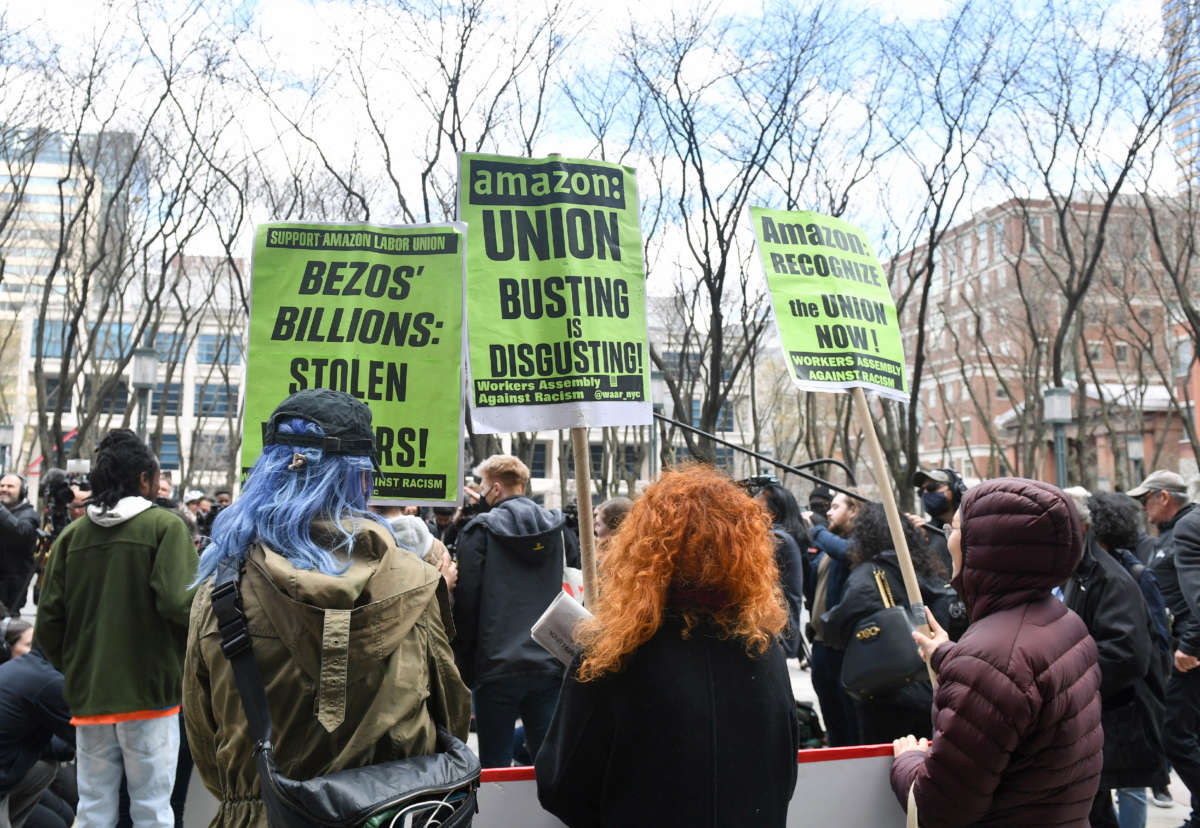Support justice-driven, accurate and transparent news — make a quick donation to Truthout today!
This week, the top legal counsel for the National Labor Relations Board (NLRB) took a formal step to make mandatory anti-union meetings illegal during union campaigns and to reinstate the Joy Silk doctrine, a long extolled labor law that would make it far easier for workers to unionize.
In a legal brief issued on Monday in an ongoing case between the Teamsters and Cemex Construction Materials Pacific, the office of NLRB General Counsel Jennifer Abruzzo called on the board to overrule a 1956 case that paved the way for employers to force workers to attend mandatory meetings in order to feed them anti-union propaganda, known as captive audience meetings.
The office also called for the labor board to reinstate Joy Silk by overruling a 1974 case that overturned the doctrine after the board had abandoned its use in the 1960s. The Joy Silk doctrine ensures that if workers approach their employer with proof that a majority of the workplace wants a union, the employer can’t reject their request without having legitimate “good faith doubt” about a majority among the workers.
As it’s relatively rare for employers to have concerns about workers forming a union other than simply not wanting them to, this would bypass the need for union elections in many cases, greatly reducing opportunities for employers to union bust.
Abruzzo, a Joe Biden appointee, has been advocating for labor reforms and last week issued a memo arguing that captive audience meetings are “inherently” unlawful under the National Labor Relations Act.
She has also said that the time frame between a union election filing and the election, during which many employers hold such meetings, is a “critical period” for anti-union employers. “They want time to coerce and intimidate workers to not vote for the union,” she said in an interview with More Perfect Union in February.
For the first time in history, NLRB personnel have finally accepted that former Associate General Counsel Dominick L. Manoli went rogue at oral argument before the Supreme Court in abandoning the Joy Silk doctrine. A major turning point in labor law that has largely been ignored. pic.twitter.com/ZYEaqvhNn2
— Brandon Magner (@BrandonMagner) April 12, 2022
“Joy Silk is logically superior to current Board law’s ability to deter election interference,” Monday’s brief says, explaining that current legal frameworks require the NLRB to be reactive to unfair labor practices charges during a union drive rather than allowing the agency to examine employers’ motivations when they refuse to bargain with their workers. Instead of deterring labor law violations, the brief continues, these frameworks open the door for them.
“After the Board replaced Joy Silk, the commission of unfair labor practices during election campaigns, including unlawful discharges, increased dramatically,” the brief explains. “In turn, the number of elections fell precipitously and, as a result, the rate of unionization now rests near all-time lows.”
Labor leaders and advocates have urged the NLRB to reinstate Joy Silk, which they say would make it far easier to form a union and could prevent workers from having to suffer abuses from employers when pursuing their right to union representation.
“Reinstating Joy Silk in its original form would stop employers from playing games and refusing to recognize a union when workers have unquestionable proof of majority support and would deter employers from unlawfully interfering in organizing campaigns,” wrote American Federation of Labor and Congress of Industrial Organizations (AFL-CIO) President Liz Shuler on Tuesday. “Reinstating Joy Silk in its original form would be a huge win for workers everywhere.”
If Joy Silk is put back into use, it could provide momentum for the labor movement, which workers have been reviving in recent months and years. Union membership has been declining for decades, partially because of lax and employee-friendly labor laws.
A terrifying moment. We appeal for your support.
In the last weeks, we have witnessed an authoritarian assault on communities in Minnesota and across the nation.
The need for truthful, grassroots reporting is urgent at this cataclysmic historical moment. Yet, Trump-aligned billionaires and other allies have taken over many legacy media outlets — the culmination of a decades-long campaign to place control of the narrative into the hands of the political right.
We refuse to let Trump’s blatant propaganda machine go unchecked. Untethered to corporate ownership or advertisers, Truthout remains fearless in our reporting and our determination to use journalism as a tool for justice.
But we need your help just to fund our basic expenses. Over 80 percent of Truthout’s funding comes from small individual donations from our community of readers, and over a third of our total budget is supported by recurring monthly donors.
Truthout has launched a fundraiser, and we have a goal to add 182 new monthly donors in the next 24 hours. Whether you can make a small monthly donation or a larger one-time gift, Truthout only works with your support.
